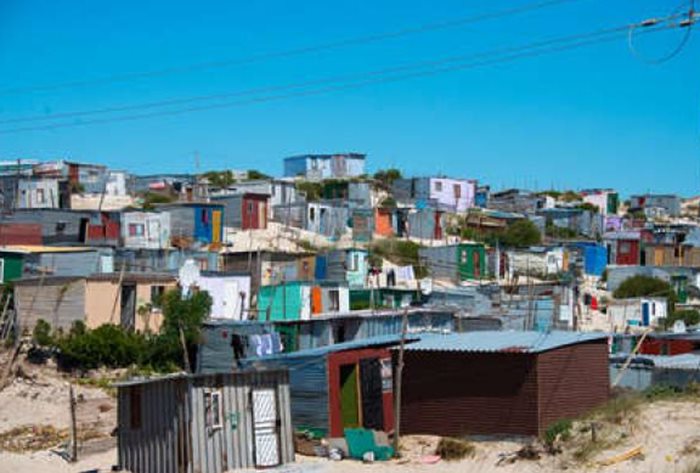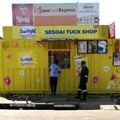Traditional e-commerce players that are ignoring households in informal settlements such as Sikandla, Soweto and Khayelitsha, are potentially missing out on an untapped market. Servicing this community signals an opportune gap for last-mile delivery companies to increase their users.

Source: 123RF. Shacks in Khayelitsha.
This was a key message from Simon Hartley, lead executive of Delivery Services at Massmart Group e-commerce.
He was speaking in a panel discussion at Ecom Africa 2022 held at the Cape Town International Convention Centre earlier this month. The topic: Enhanced distribution and fulfilment planning with regards to last-mile delivery logistics in South Africa.
The panel members included Ya’essh Cader, head of Digital and Ecommerce at Sanlam Investments; and Arvind Sahay, regional head, Middle East and Africa, for Fareye, based in the United Arab Emirates.
What started out as a discussion on how e-commerce fulfillment has taken the middleman out of distribution, providing faster delivery, affordable prices, and better customer service, morphed into an interesting debate around the untapped e-commerce market potential of serving township communities..
"In my opinion, there is a huge portion of the population that gets written off by retail planners because they're living and shopping in an informal settlement. This is especially pertinent when you consider that 90% of [informal] retail trade occurs in the townships," said Hartley.
A recent report reflects that 134,000 traditional trade stores are spread across South Africa and growing. This has increased by 100,000 outlets in the last 20 years, with the same number of estimated spaza shops across the nation.
The data speaks for itself
Statistics say informal retailing is significant and evolving. A study by consumer-behaviour monitor Nielsen South Africa found that the informal or independent retail-trade sector boasted R46bn in annual sales.
That was in 2016.
More recent data subsequently reflects that the informal retailing channel makes up 67% of total retail across Kenya, Nigeria and South Africa. This contribution, although skewed slightly by South Africa’s highly developed modern retail channel, still points to the importance of the informal retail market in major African countries.
These figures signal an opportune gap for big retailers to capture increased market share in emerging townships, particularly when it comes to the delivery of groceries.
Already making inroads to this end, is Yebo Fresh, a tech-driven food-delivery company catering exclusively to Cape Town townships, which expanded rapidly under lockdown.
The visionaries already paving the way
Yebo Fresh started in 2018 in a Hout Bay garage. It now occupies a massive warehouse and is delivering thousands of grocery items and hampers into nine Western Cape townships.
"Townships are still largely underserved by big retailers," said Jessica Boonstra in a 2020 interview. "People living in townships often lose hours of their day, most relying on overcrowded public transport to go to a supermarket. Buying groceries and then transporting them on public transport into a township is a complex and often costly process for residents."
Yebo Fresh's system allows households to order goods online, via Whatsapp, or over the phone with a call-back feature, and have them delivered to their doors.
In Gauteng, for example, Swypa Delivery, is expanding its reach in Gauteng, with the launch of its food-delivery app. Founded in Tembisa during the height of Covid-19, Swypa Delivery offers logistics solutions that assist with the delivery of food, liquor, groceries, parcels and medicine, and offer business support.
Founder, Boitumelo Monageng, and managing director, Thabang Kgopane hope to grow the business to serve consumers nationwide.
The challenges of food delivery in townships
"Key to a successful final-mile delivery system is delivering goods quickly, affordably and on time - and in townships this remains a challenge," says Hartley. He adds that apartheid's legacy of poor town planning in townships is the reason.
The overall consensus among the panel of speakers tackling this topic was that South African townships are highly characterised by a fragmented logistics network, and a complex spectrum of unstructured street numbers.
"Google Maps won't help [final-mile delivery companies here]. It won't tell [drivers] if a road has gravel on it or if it's tarred, or if there is a petrol station nearby or not," Hartey said.
"Addressing" also remains a challenge for final-mile delivery operations in urban and rural settings too - and is something Big Retailers can learn from before launching into delivering groceries to township communities.
Arvind Sahay of Fareye spoke to the fact that many third-party delivery services are charging final-mile delivery businesses high fees for having to re-route parcels that have been delivered to incorrect addresses.
Within this process, address details are frequently captured incorrectly or the customer doesn't know their postal code, or does not relay this correctly. It's not uncommon, therefore, for a parcel meant for Cape Town to land up in KZN, as an example.
A solutions-based approach
Locating specific geo-location bearings is the solution here, Hartley said.
"Everyone's got a smartphone and that means the ability to drop a pin or amend a location in real time. In most markets across the world if you can do that, you can get both accuracy of delivery and introduce flexibility of delivery that an alternative address does not offer. This is why WumDrop - a courier company co-founded by Hartley in 2014 - has a first-time delivery success of 98%. This is as opposed to other companies - depending on whether they're data chaining - of between 72 and 90%. This has real cost implications, because our drivers only deliver once."
It's no wonder Makro, part of JSE-listed company Massmart, acquired a majority stake in WumDrop in 2017, and that it now delivers successfully to spaza shops in the townships.
"Furthermore owning your own driver network, and tracking and capturing address data, is key to faster deliveries."
"One thing I can say for sure is for a final-mile delivery service to be successful in servicing a township, it needs to recruit drivers from the area. The solution involves engaging the individual community, hiring from the community, and yes, it involves dealing with cash, and it will for a long time."
Logistically speaking though, no two townships are the same. Each township needs to be approached on it’s own merits.
"The same pilot for Alex is not a one-size fits all for all townships. We need a customised pilot for Sikandla, a plan for Soweto and one for Khayelitsha because each of these places grew organically," Hartley said.
Tackling poverty and hunger head on
Most importantly, [being successful in this market] involves staying obsessed with the experience of every person in the delivery supply chain," Hartley said.
"Ultimately if we can make township supply chains more reliable and efficient, we can make them cheaper," Hartley said:
"If we can make them cheaper, we can pass the transport cost saving on to spazas, and empower them to compete.
"When competition happens, we’ll put more spending power into the pockets of South Africa’s citizens and residents."
And what is more life-giving than being able to afford food?












































